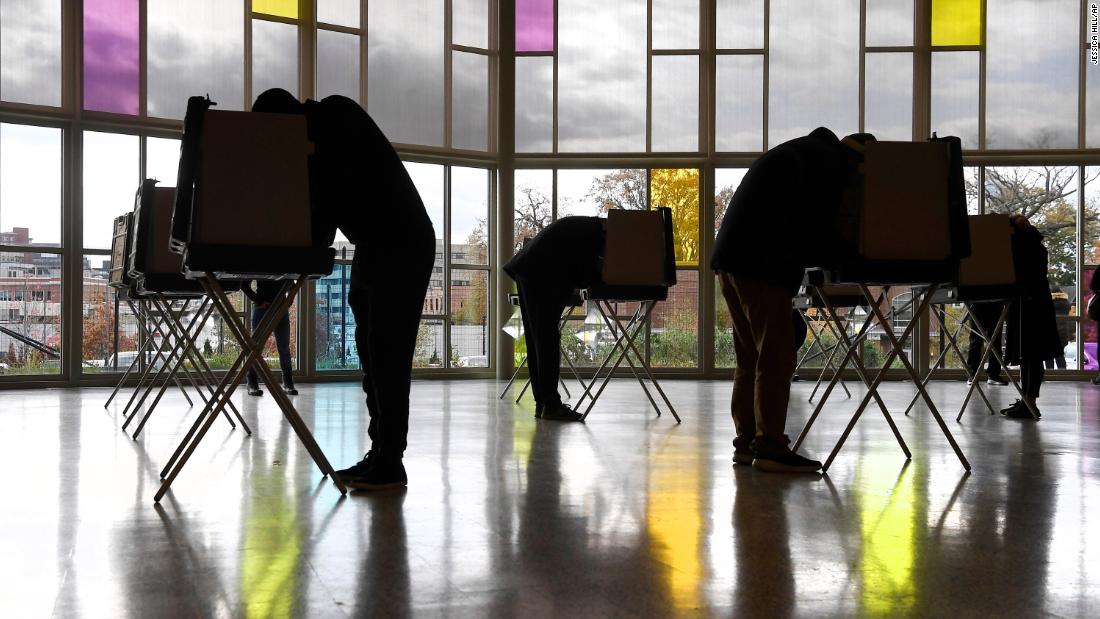Voters divided over top issues in their vote for president, early CNN national exit poll shows
About one-third called the economy their most critical issue, while roughly 1 in 5 citing racial inequality and about 1 in 6 named the coronavirus pandemic as most important to their vote. Roughly 1 in 10 each cited health care policy and crime and violence as their top issue.
Even though more cited the economy than coronavirus as their most important issue in choosing a candidate, a narrow majority say that the nation’s priority now should be containing the coronavirus over rebuilding the economy.
That finding comes as most voters feel the nation’s efforts to contain the virus are going badly. With coronavirus cases rising in many states, nearly 7 in 10 voters say they view wearing a face mask as a public health responsibility more than as a personal choice.
Views on all things coronavirus divide voters based on political leanings. President Donald Trump’s supporters are far more likely to call the economy their top issue (about 6 in 10 of the President’s supporters say so) than to cite coronavirus (just 5% feel that way), while among former Vice President Joe Biden’s supporters, more cite coronavirus (around 3 in 10) than the economy (about 1 in 10).
Roughly 7 in 10 Trump backers say rebuilding the economy should be the nation’s priority over containing the spread of the virus, while among Biden supporters, nearly 8 in 10 go the other way, saying that containing the coronavirus should be the bigger priority.
About half of voters say the nation’s economy is in poor shape, though more say they are better off today than four years ago (around 4 in 10) than say they are worse off today (2 in 10). Still, a majority say they are experiencing financial hardship as a result of the coronavirus pandemic.
The majority of Trump and Biden supporters said they cast ballots more in support of their candidate than against his opponent, though Trump’s base was even more loyal to him. More than 4 in 5 people said they voted for the President, while just under two-thirds of Biden’s voters said the same.
The top quality voters were looking for in a president was a strong leader. One third said so, while just under a quarter were wanting someone with good judgment and just over one-fifth thought a candidate who “cares about people like me” was most important. Fewer than one-fifth were looking for someone who can unite the country.
When it comes to the issues, nearly three-quarters of voters said a candidate’s position on the issues was most important, while less than quarter named the candidate’s personal qualities.
More than half of voters said the Supreme Court should keep Obamacare as it is. Justices will hear oral arguments on a case that seeks to overturn the landmark health reform law next Tuesday.
More than 3 in 5 voters said that Supreme Court appointees were an important factor in their vote — Trump named three justices in his first term, shifting the court to the right.
Two-thirds of voters said that climate change is a serious problem.
Voters largely found the experience of casting their ballots to be an easy one, though there is a wide gap between the share of White voters who say it was very easy (roughly three-quarters) and the share of Black voters who feel the same way (about half). About half overall say they are very confident that votes in their states will be accurately cast and counted, about the same as four years ago.
With a tidal wave of early and absentee voters this year, very few made up their minds in the final days of the contest: Just 4% say they made up their minds in the final week of the campaign, and almost three-quarters said they made up their minds before September.
The survey suggests a high level of new voter participation. About 1 in 8 say 2020 is the first year they have ever voted, about on par with the share saying so in 2008.
CNN Exit Polls are a combination of in-person interviews with Election Day voters and telephone polls measuring the views of absentee by-mail and early voters, and were conducted by Edison Research on behalf of the National Election Pool. In-person interviews on Election Day were conducted at a random sample of 115 polling locations nationwide among 7,774 Election Day voters. The results also include 4,919 interviews with early and absentee voters conducted by phone. Results for the full sample have a margin of error of plus or minus 2 percentage points; it is larger for subgroups.
This story is breaking and will be updated.
![]()


